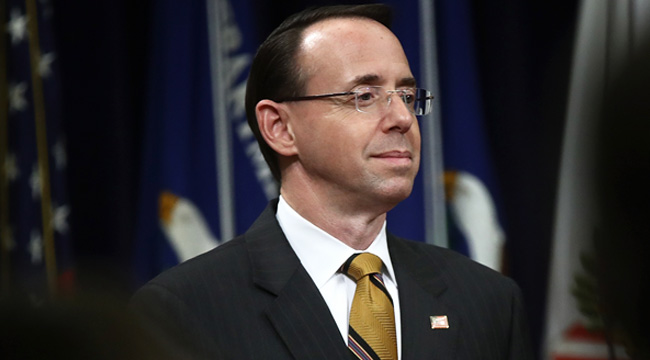
On Thursday night, Deputy Attorney General Rod Rosenstein issued a head-scratcher of a statement that seemingly arrived out of the blue. Rosenstein, of course, is currently the highest-ranking Justice Department official who’s overseeing Special Counsel Robert Mueller’s investigation into Trump-Russia ties. He also recently announced that Mueller was going nowhere after reports that President Trump wanted to fire the newest pain in his butt.
Now, here comes this odd statement, which urges Americans to cast doubt upon any “anonymous allegations” that come from purported U.S. government officials. Such sources are commonplace these days, particularly when it comes to leaks that land in the New York Times or Washington Post. The general pattern with the Trump era (so far) is that these stories emerge, the White House denies them, and then they’re later proven true. Yet Rosenstein says this without much explanation:
“Americans should exercise caution before accepting as true any stories attributed to anonymous ‘officials,’ particularly when they do not identify the country — let alone the branch or agency of government — with which the alleged sources supposedly are affiliated.
“Americans should be skeptical about anonymous allegations. The Department of Justice has a long-established policy to neither confirm nor deny such allegations.”
Naturally, rumors are circulating on social media about this statement being prompted by the possibility of a Trump-related video — related to the Golden Showers dossier (natch) — surfacing. However, it’s likely that Rosenstein’s cryptic words pertain to the recent report (which Trump blasted as “phony”) from WaPo about how Muller was investigating Trump for obstruction of justice. And there’s the possibility that Rosenstein is suggesting that anonymous officials might actually hail from foreign states.
Regardless of what the heck Rosenstein was really talking about, this is — as the NY Times Maggie Haberman noted — a statement unlike any other.
Have literally never seen a statement like this https://t.co/94zbnIqsVc
— Maggie Haberman (@maggieNYT) June 16, 2017
(Via USA Today)
